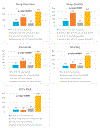Association of sleep characteristics with cardiovascular health among women and differences by race/ethnicity and menopausal status: findings from the American Heart Association Go Red for Women Strategically Focused Research Network
- PMID: 31302068
- PMCID: PMC6801046
- DOI: 10.1016/j.sleh.2019.05.005
Association of sleep characteristics with cardiovascular health among women and differences by race/ethnicity and menopausal status: findings from the American Heart Association Go Red for Women Strategically Focused Research Network
Abstract
Background and objective: Sleep is an emerging risk factor for cardiovascular disease (CVD) that is not currently included as a cardiovascular health (CVH) metric in the American Heart Association's Life's Simple 7 (AHA LS7). Our objective was to evaluate the association of sleep with CVH in women and examine differences by menopausal status and race/ethnicity.
Methods: Baseline data from the Columbia University AHA Go Red for Women Strategically Focused Research Network were examined. Sleep habits were self-reported using validated questionnaires. A CVH score was computed using AHA LS7 criteria for smoking, diet, physical activity, BMI, blood pressure(BP), total cholesterol, and fasting glucose. Women received a score of 2 (ideal), 1 (intermediate), or 0 (poor) based on their level of meeting each AHA LS7 metric. Multivariable-adjusted regression models were used to evaluate associations of sleep with meeting overall and individual CVH metrics.
Results: The analytical sample consisted of n = 507 women (62% minority/Hispanic, mean age:37 y). Participants with adequate sleep duration (≥7 h), good sleep quality, no insomnia nor snoring, and low risk for OSA were more likely to meet >4 of the AHA LS7 metrics (P < .01). Poorer sleep quality (β = -0.08, P = .002), higher insomnia severity (β = -0.05, P = .002), snoring (β = -0.77, P = .0001), and higher risk for OSA (β = -1.63, P < .0001) were associated with poorer CVH. Insomnia, snoring, and high OSA risk were associated with 69% to >300% higher odds of having poor CVH (P ≤ .03). Associations were stronger in post-menopausal and racial/ethnic minority women.
Conclusions: Better sleep habits were associated with more favorable CVH among women, suggesting that there may be benefit in incorporating sleep assessment into CVD risk screening.
Keywords: AHA Life’s Simple 7; Cardiovascular health; Menopausal status; Race/ethnicity; Sleep.
Copyright © 2019 National Sleep Foundation. Published by Elsevier Inc. All rights reserved.
Figures

Similar articles
-
Evening chronotype is associated with poor cardiovascular health and adverse health behaviors in a diverse population of women.Chronobiol Int. 2020 May;37(5):673-685. doi: 10.1080/07420528.2020.1732403. Epub 2020 Mar 4. Chronobiol Int. 2020. PMID: 32126839 Free PMC article.
-
Redefining Cardiovascular Health to Include Sleep: Prospective Associations With Cardiovascular Disease in the MESA Sleep Study.J Am Heart Assoc. 2022 Nov;11(21):e025252. doi: 10.1161/JAHA.122.025252. Epub 2022 Oct 19. J Am Heart Assoc. 2022. PMID: 36259552 Free PMC article.
-
Differences in Cardiovascular Health at the Intersection of Race, Ethnicity, and Sexual Identity.JAMA Netw Open. 2024 May 1;7(5):e249060. doi: 10.1001/jamanetworkopen.2024.9060. JAMA Netw Open. 2024. PMID: 38691360 Free PMC article.
-
State of the Nation's Cardiovascular Health and Targeting Health Equity in the United States: A Narrative Review.JAMA Cardiol. 2021 Aug 1;6(8):963-970. doi: 10.1001/jamacardio.2021.1137. JAMA Cardiol. 2021. PMID: 34009231 Free PMC article. Review.
-
Ideal cardiovascular health and cardiovascular-related events: a systematic review and meta-analysis.Eur J Prev Cardiol. 2024 Jun 3;31(8):966-985. doi: 10.1093/eurjpc/zwad405. Eur J Prev Cardiol. 2024. PMID: 38149986
Cited by
-
Multidimensional Sleep Health Is Associated with Cardiovascular Disease Prevalence and Cardiometabolic Health in US Adults.Int J Environ Res Public Health. 2022 Aug 29;19(17):10749. doi: 10.3390/ijerph191710749. Int J Environ Res Public Health. 2022. PMID: 36078471 Free PMC article.
-
The menopausal transition period and cardiovascular risk.Nat Rev Cardiol. 2024 Mar;21(3):203-211. doi: 10.1038/s41569-023-00926-7. Epub 2023 Sep 26. Nat Rev Cardiol. 2024. PMID: 37752349 Review.
-
A Mediterranean Dietary Pattern Predicts Better Sleep Quality in US Women from the American Heart Association Go Red for Women Strategically Focused Research Network.Nutrients. 2020 Sep 16;12(9):2830. doi: 10.3390/nu12092830. Nutrients. 2020. PMID: 32947817 Free PMC article.
-
Adverse Changes in Body Composition During the Menopausal Transition and Relation to Cardiovascular Risk: A Contemporary Review.Womens Health Rep (New Rochelle). 2022 Jun 13;3(1):573-581. doi: 10.1089/whr.2021.0119. eCollection 2022. Womens Health Rep (New Rochelle). 2022. PMID: 35814604 Free PMC article. Review.
-
Psychosocial factors are associated with sleep disturbances and evening chronotype among women: A brief report from the American Heart Association Go Red for Women Strategically Focused Research Network.Sleep Health. 2024 Feb;10(1):65-68. doi: 10.1016/j.sleh.2023.10.017. Epub 2023 Nov 25. Sleep Health. 2024. PMID: 38007300 Free PMC article.
References
-
- Lloyd-Jones DM, Hong Y, Labarthe D, et al. Defining and setting national goals for cardiovascular health promotion and disease reduction: The American Heart Association’s strategic impact goal through 2020 and beyond. Circulation. 2010;121(4):586–613. - PubMed
-
- Lloyd-Jones DM. Cardiovascular health and protection against CVD: More than the sum of the parts? Circulation. 2014;130(19):1671–1673. - PubMed
Publication types
MeSH terms
Grants and funding
LinkOut - more resources
Full Text Sources
Medical

